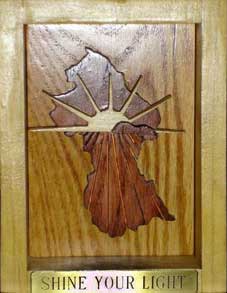
Photo by Tim Carter.
![]() The study of Peoples Temple radio communications between Guyana and the U.S. represents a challenging, yet important, aspect of studying the Jonestown community. It is important, because the radio provided the only link in daily communication for the Temple in those days before computers, the internet, and wireless telephone technology. In addition, the communications weren-t always permissible under ham licensing agreements with the Federal Communications Commission (FCC) – the frequencies are designated for amateur radio use, and business activities are specifically prohibited – so the Temple had to devise ways around the restrictions in order to request supplies, monitor events, and exchange organizational information. Avoiding detection often involved such techniques as shifting frequencies, the use of coded language, cajoling (or sometimes chastising) other ham operators who attempted to break in, or – most often – a combination. Finally, the tapes which the FBI recovered at Jonestown were Peoples Temple recordings, made by Jim Jones and other members; the tapes of Temple radio communications were often made by ham operators and/or Temple critics in order to record license violations, and submitted to the FCC. The contents of the radio tapes may have been stage-managed as much as the others in the collection, but they weren-t stage-managed by members of Peoples Temple.
The study of Peoples Temple radio communications between Guyana and the U.S. represents a challenging, yet important, aspect of studying the Jonestown community. It is important, because the radio provided the only link in daily communication for the Temple in those days before computers, the internet, and wireless telephone technology. In addition, the communications weren-t always permissible under ham licensing agreements with the Federal Communications Commission (FCC) – the frequencies are designated for amateur radio use, and business activities are specifically prohibited – so the Temple had to devise ways around the restrictions in order to request supplies, monitor events, and exchange organizational information. Avoiding detection often involved such techniques as shifting frequencies, the use of coded language, cajoling (or sometimes chastising) other ham operators who attempted to break in, or – most often – a combination. Finally, the tapes which the FBI recovered at Jonestown were Peoples Temple recordings, made by Jim Jones and other members; the tapes of Temple radio communications were often made by ham operators and/or Temple critics in order to record license violations, and submitted to the FCC. The contents of the radio tapes may have been stage-managed as much as the others in the collection, but they weren-t stage-managed by members of Peoples Temple.
The tapes are challenging, though, in that they were recorded from the airwaves. There is much static, there is much dead air as the ham operators chase the Temple signal across the band to another frequency, and there is much amateur radio jargon, all of which makes them difficult for the casual listener to comprehend. The coded messages add to the challenge in following the thread of the conversation.
Because of the importance of the FCC’s relationship with the Temple, though, the Alternative Considerations website has linked to a site for Temple ham radio communications. The site was recently created by Joey Dieckman, who has spent several years investigating the FCC’s relationship with Peoples Temple, and we extend a special thanks to Joey for creating this resource. The new “Tape” link will open to three subdirectories: the FBI Audiotape Project for the FBI tapes; the new FCC/ham radio site; and a collection of tapes from non-governmental sources (which is still under construction).
The ham tapes which were obtained from the FCC under the Freedom of Information Act will be placed in the new subdirectory as they are transcribed. Other items will include radio-related materials such as the scans of QSL cards sent by ham radio operators who made radio contact with Jonestown and subsequently exchanged cards. In addition, two hams generously donated their WB6MID/8R3 cards to the website (Thanks to Bob Cregar and Earl Shobe). Also included are some scans of radio-related documents, letters, news articles, and the like. There is also a copy of Larry Schacht-s membership application to the Medical Amateur Radio Council (Thanks to Robert Smithwick for all your wonderful donations). Much of this material will take some evaluating and sorting, but this directory accomplishes the first goal of making the information available to anyone who desires to see it.
In other radio-related news:
• Although he was never really nameless, we were finally able to put a name to the “other” person in one of the photos on the tri-panel QSL card. In the photo, Don Fitch is seen supervising a young man holding a blow torch. The young man is Mark Wagner.
• We would like make a request to the readers of this article. In April, when many folks traveled to the Bay Area to see the play, Joey Dieckman met a woman after dinner on the way to the theater. As our large crowd moved down the sidewalk, he explained that he was doing research about ham radio usage by the Temple. She mentioned that she worked the radio in San Francisco and that she would be more than happy to open a dialogue about it. In the course of the evening, Joey forgot her name, and if he ever had her contact information, he lost it. Please, if this sounds like you, or you know who this woman might have been, contact him at josefdieckman@yahoo.com.
• Finally, Joey has made some phone calls to hams and spoken to them about their experience speaking to Jonestown. Basically, most of the stories are the same: short contacts in which the most basic of information is exchanged. However, one ham he spoke to remembers making a cross-mode contact to Jonestown when he was just a teenager. We will gather these stories and publish them in future editions of the jonestown report, and on our new website location.